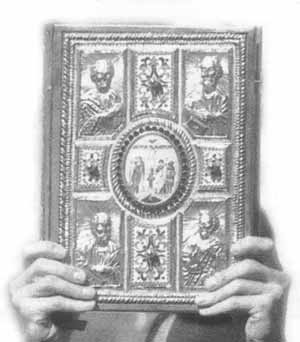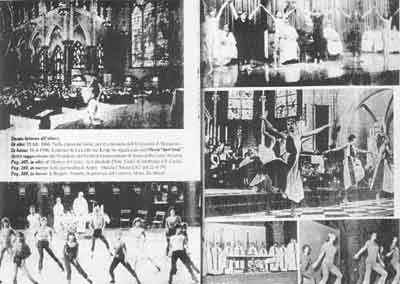

![]()
![]()
|
January 1999 No. 30
In its Letter to the Editor column, the Paulinian review for "pastoral workers" (Vita Pastorale, no.6, 1997), published a letter from a worried reader requesting a "reassuring answer" regarding Cardinal Ratzinger's declarations in his auto- biography (La mia vie-My Life)
Rinaldo Falsini, O.F.M., counsellor to the Congregation of Sacred Rites (Divine Liturgy) writes, amongst other things:
The so-called 0rdo Missae of St. Pius Vamere dried-up trickle of water? (In that case, what can be said about Paul VI's mini-Ordo?) And how 'could the Rite of St. Pius V have ever become "unable to water and nourish the faith and piety of the Christian people," after having watered and nourished it in a truly remarkable manner for so many centuries upon centuries, including so many canonized saints? Cardinal Ratzinger gives his viewpoint in his autobiography:
Pope St. Pius V, therefore, did nothing more than to extend to all western countries the traditional Roman Mass of all times as an in-surmountable barrier to Protestantism. On the contrary, Fr. Falsini falsely writes:
The comparison between what Pope St. Pius V did and Pope Paul VI did does not hold up. We contend that Pope Paul VI "had to abolish" the traditional Roman Rite because the so-called "pastoral ends" of the Council did not concern Catholics, as they should have done, but Protestants. Although mindful of Cardinals Ottaviani and Bacci's Brief Critical Examination accurately denouncing Paul VI's Novus Ordo for its "impressive departure from the Catholic theology of Holy Mass," we cite a quote from an even more authorized and irrefutable source: "The prayer of the Church must not be seen as a stumbling block for anyone," wrote Mgr .Bugnini in the Osservatore Romano (Mar. 17, 1965) . Since it was inevitable that the "prayer of the Church" clashed with those outside the Church, he followed this up by saying that the Catholic Church, therefore, had to:
Not quite two years later, Osservatore Romano (Oct. 13, 1967) announced that the operation could be considered a success:
In this, then, it becomes unmistakably clear that Fr. Falsini's comparison is lacking in all validity. Pope St. Pius V never abolished the traditional Roman Rite, but only all of the other rites dating back to less than 200 years, and he did so because these had become suspect of Protestant pollution or accretions. What he did was to extend to all of the western nations the Roman Missal since it was "most assuredly Catholic." Pope Paul VI, however, did quite the contrary by "abolishing" the traditional Roman Rite, and he did so because it was too Catholic, while promulgating a new Protestantized Missal. The difference is momentous.
Liturgical Experimentation in the sanctuary.
From Paolo VI beato?,
Under what pretense is it to be claimed that Pope Paul VI did, indeed, abolish the use of Pope St. Pius V's Missal? This has never been proven. Also, it must be demonstrated beyond doubt that he had any right at all to abolish the most venerable Rite of the Latin Church and this, solely to please Protestants. In fact, in Paul VI's constitution Missale Romanum, nowhere is there to be found a solemn and imperative act of abrogation (i.e., a total repeal of a law} which is recorded in Pope St. Pius V's Quo Primum (SISINONO, vol. I, No.9, p.5), but merely: "Ad extremum ex iis quae hactenus de novo Missali Romano exposuimus quiddam nunc cogere et efficere placet," which translates as follows:
However, self-seeking liberals hastened to translate very liberally (i.e., erroneously) the all-important phrase:
In addition, the very idea that Pope Paul VI, in promulgating his Novus Ordo Missae, also "abolished" the use of Pope St. Pius V's Missal was so vague that inquiries on this matter came pouring in from all over the world to the Holy See, as testified by one of the principal artisans of the Novus Ordo Missae, Mgr. Annibale Bugnini, in La reforma liturgica ( CLV-Edizioni Liturgiche, Rome 1983). Also, it is even more doubtful that Pope Paul VI was at all authorized to abolish a rite of essentially Apostolic origin and this, for no stronger intention than of simply pleasing non-Catholics. In God's Holy Catholic Church, less than anywhere else, just laws do not depend on a superior's caprice, whims, or fancies. It is on this very account that a question was raised by a liturgical expert (unaffiliated with the Society of Saint Pius X - Ed.], Mgr. Klaus Gamber, Director of the Ratisbonne Institute of Liturgical Sciences (1979) and honorary member of the Pontifical Liturgical Academy in Rome: "Is the Pope entitled to change a Rite having its origins in Apostolic Tradition?" (Die reform der Romischer Liturgie Vorgeschichte und Problematik). "History," he writes, "teaches us that no pope has ever done such a thing." He continues:
And today Cardinal Ratzinger echoes his words: "Such a state of affairs had never before occurred throughout the entire history of Catholic liturgy" (La mia vita). In order to come across anything similar to Pope Paul VI's "liturgical reform," we must step out of the limits of Catholicism and examine a precedent, scandalously dishonorable for Pope Paul VI, in Martin Luther's "liturgical reform," which "destroyed the Roman Mass while retaining various external forms," including Gregorian Chant (Gamber, loc. cit.). Even though "the content and the structure" of the traditional Roman Rite were merged into the new rite, it would still not be sufficient. Mgr. Gamber has written:
And now we hear Cardinal Ratzinger echoing those very same words. With Pope Paul VI's "liturgical reform" more than a simple "revision" of the former Missal has happened. Says Cardinal Ratzinger:
On this point we are in complete agreement with the Cardinal Prefect of the Congregation for the Faith. We are certainly aware that Suarez, along with Cajetan and other outstanding theologians, proposes as an example of malfeasance in office a pope who reaches the point "of changing all of the Church's rites based on and strengthened through Apostolic Tradition" ("si vellet omnes ecclesiasticas caeremonias apostolica traditione firmatas evertere" [De Charitate disput., 12, I.]). It is obvious therefore that Suarez, in company with other eminent theologians, refuses to recognize the spurious authority which Pope Paul VI attributed to himself in his "ecumenical" obstinacy. Be that as it may, it remains absolutely certain that the authority entrusted to the pope exists, just as and even more so than any other authority in the Church, for the building up and sanctification of the Mystical Body of Christ, not for its ruin and destruction. Gorgonius
Courtesy of the Angelus
Press, Kansas City, MO 64109 |



